Asia extreme
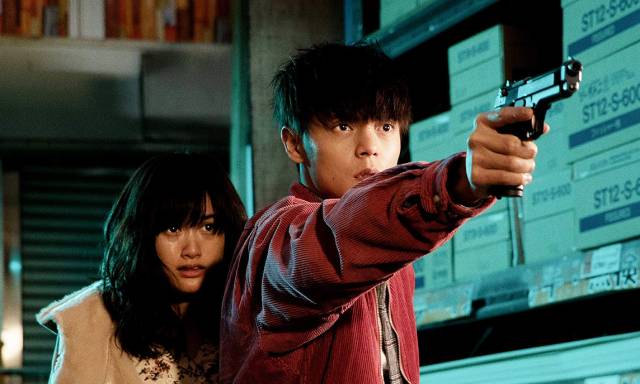
in Takashi Miike’s First Love (2019)
Although there are obviously differences from culture to culture, many Asian movies share a tendency to ignore the kind of “realism” Western, and particularly American, movies so often feel is necessary – which is one reason why so many U.S. remakes of Asian genre movies take on a pedestrian quality nowhere evident in the originals. Three recent Asian movies – from Korea, Japan and China – use different approaches to explore societies in which economic and social inequality engender violence and to some degree madness. One uses blackly comic satire, one pushes genre tropes to absurd extremes, and one pushes neorealism into the realm of nightmare.
*

in Bong Joon-ho’s Parasite (2019)
Parasite (Bong Joon-ho, 2019)
It’s unfortunate that I didn’t get to see Bong Joon-ho’s Parasite (2019) until after the Oscars. Apart from the Best Picture win, I’d been seeing critics for months calling it the best film of the year, a masterpiece. That kind of press can’t help but shape your expectations, and I confess that when I finally watched it on Blu-ray, I had a mixture of excitement and wariness – the kind of perceptual frame which all too easily can distort what you’re seeing.
In many ways, Parasite is Bong’s most entertaining film. Its mix of satire, comedy, suspense and social critique is beautifully balanced – in fact, it’s his most assured film yet, with the director in absolute and seemingly effortless control of his material. The second thing to note is that it is something of a return to his roots after a diversion of several years into the realm of internationally oriented fantasy productions. While there is a consistency of themes throughout his work – particularly the impact of class and economic inequality on individual lives – his international success came with the release of an unashamed monster movie, The Host (2006). This was followed by the visually dynamic but vacuous spectacle of Snowpiercer (2013) and the surprisingly dark Okja (2017), which on a superficial level has the appearance of a children’s fantasy.
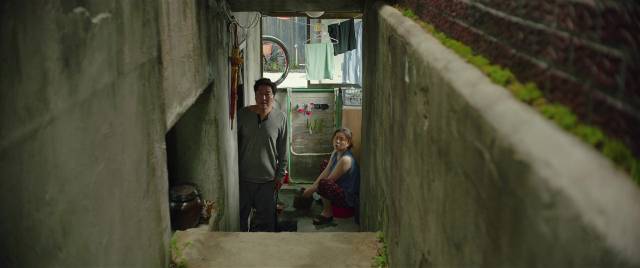
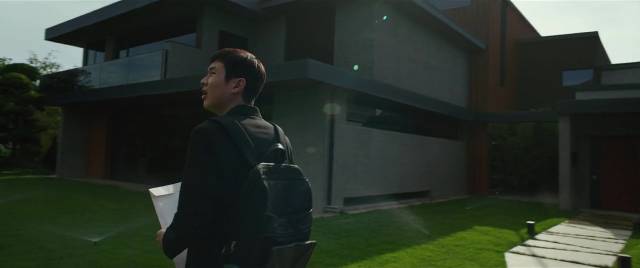
Parasite, despite a title which suggests a connection to The Host, hearkens back to the more realistic films in which he explores contemporary Korean society with a mix of humour and horror – Barking Dogs Never Bite (2000), Memories of Murder (2003) and Mother (2009). These are films in which ordinary people are driven by harsh circumstances to commit acts which alter the courses of their and other lives in unforeseen and unintended ways. These characters are at the mercy of social and economic forces far beyond their control. This is a theme which Parasite seizes and explores with a vengeance, giving Bong’s view of the world its clearest expression yet.
At first glance, Parasite appears very schematic. It introduces two parallel families – one poor, living in a dank basement whose windows look out on an alley where drunks urinate against the wall; one wealthy, living in a large, bright modernist house with a beautiful garden protected by a wall and security system. Quite quickly we learn two important things – that the privilege of the rich family brings with it deep insecurities (when you own a lot, you have a lot which may potentially be lost), and that the economic uncertainties of the poor family have fostered a wide range of survival skills and an ability to work together to manipulate the social forces arrayed against them.
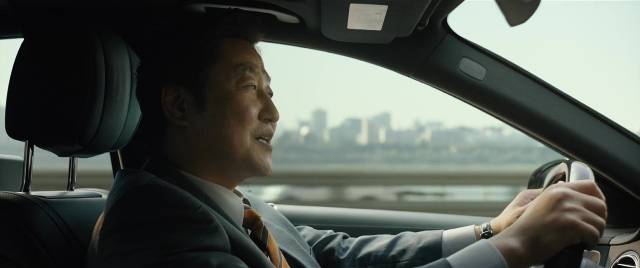
Son Kim Ki-woo (Choi Woo-sik) hears about the Parks, a wealthy family which needs a tutor for their adolescent daughter, Da-hye (Jung Ji-so). Ki-woo cons his way into the job with a fake graduation certificate whipped up on a computer by his sister Ki-jung (Park So-dam). His self-assurance is enough to overwhelm any doubts the girl’s mother, Park Yeon-kyo (Jo Yeo-jeong), might have. Once established, Ki-woo recommends Ki-jung as an art therapist for the family’s troubled young son, Da-song (Jung Hyun-jun). Ki-jung in turn recommends their father, Kim Ki-taek (Bong regular Song Kang-ho), when Mr. Park (Lee Sun-kyun) needs a new chauffeur, and Ki-taek sabotages the family’s housekeeper by making it appear that she has tuberculosis, then recommends his wife Chung-sook (Jang Hye-jin) for the job. The Parks remain blithely unaware that their four new employees have any connection with one another, even as the Kims assume a remarkable degree of control over their lives.
The first half of the film is an entertaining comedy of social inequality; it’s enormously satisfying to watch the Kims manipulate the privileged Parks. But as in some of Bong’s other films, something occurs midway through which shifts the terms of the narrative. A new conflict is introduced which exposes the Kims’ own deep vulnerabilities … conflict exists not only between social classes, but also within the underclass itself. Those near the bottom have to fight one another for the scraps to be gleaned from the privileged.

As the narrative unfolds, heading inexorably towards an eruption of violence, a violence which is an integral element of such unstable social relationships, the title itself is revealed as deeply ambiguous. At first it seems that the Kims, insinuating themselves into the Parks’ lives, are the “parasites”, but in truth, the existence of the privileged, which is totally dependent on exploiting the vulnerability and desperation of the underprivileged, is itself parasitic – in fact, objectively worse than that of the underclass because it is their appropriation of social and economic resources which forces the less privileged into using their innate skills in “dishonest” ways. A society which permits and encourages exploitation of the poor by the rich (i.e. the essence of capitalism) breeds paranoia, distrust, dishonesty and ultimately violent conflict.
This theme, blown up to cartoonish exaggeration in Snowpiercer, is returned in Parasite to the real, contemporary world with devastating effect.
*
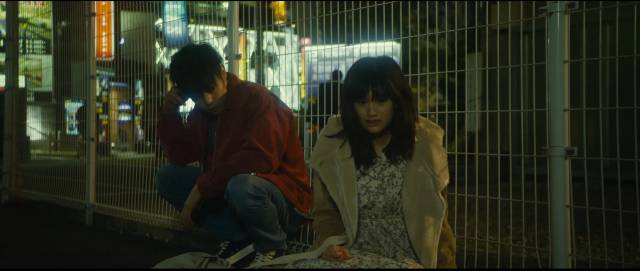
First Love (Takashi Miike, 2019)
Takashi Miike’s work doesn’t reveal such a clear consistency of interests and themes. Considering the speed with which he works and the sheer volume of his output – something like a hundred movies in less than thirty years – this isn’t really surprising. Miike has often seemed more interested in the pleasure of playing with familiar genre conventions, twisting them into new variations just for the fun of it. He has made gangster films, comedies, samurai movies, kids’ fantasies, horror, science fiction … sometimes combining multiple genres in a single film. And sometimes creating disturbing critiques of contemporary society – like Visitor Q (2001) and Audition (1999) – with an emphasis on extreme behaviour and graphic forms of sexuality and violence.
It’s not surprising that he has repeatedly returned to the yakuza genre, steeped as it is in rituals of transgression and violence. Some of his earliest work was in this genre, and so is his latest feature, First Love (2019), one of his most entertaining and satisfying movies in a while. It plays like a Tarantino movie without the overbearing aura of self-satisfied, smug cleverness. An intricate weaving together of multiple plot strands and characters revolving around rival gangs involved in the drug trade, with the usual issues of betrayal and retribution, it centres on two peripheral characters who find themselves unwillingly drawn into an escalating gang war.
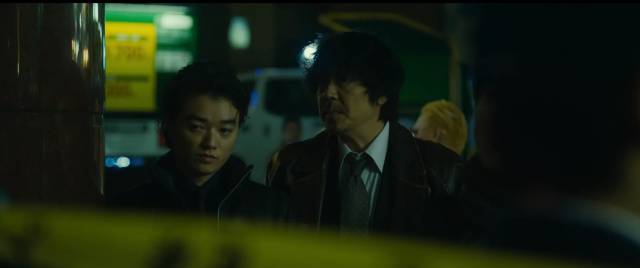
These are a rising young boxer named Leo (Masataka Kubota) and a young prostitute named Monica (Sakurako Konishi). Leo has just been told by a doctor after a fight in which he was knocked out that he has an inoperable brain tumour and doesn’t have long to live. Previously unmotivated (he boxes only because it’s something he’s naturally good at, not because he has any ambition), he wanders aimlessly through the city. When he sees a young woman being chased by a man, he reacts automatically by knocking the man out. He only finds out later that the man is a cop – in fact, a crooked cop who’s involved in a drug deal gone wrong and mistakenly suspects the woman of knowing where the drugs are.
Monica is a reluctant prostitute, given to a gang by her father to pay off his debts. Because of her drug addiction and connection with a gang member who’s been killed, everyone thinks she’s stolen the drugs herself. As the night goes on, Leo and Monica gradually form a bond and try to extricate themselves from the increasing violence. Believing he’s dying makes Leo fearless and he puts himself at risk to help Monica as things progress to mutually destructive slaughter among the gangs.
First Love is an exhilarating mixture of comedy, violence and romance which tempers Miike’s transgressive tendencies with a genuinely sweet emotional engagement with two likeable characters.
*
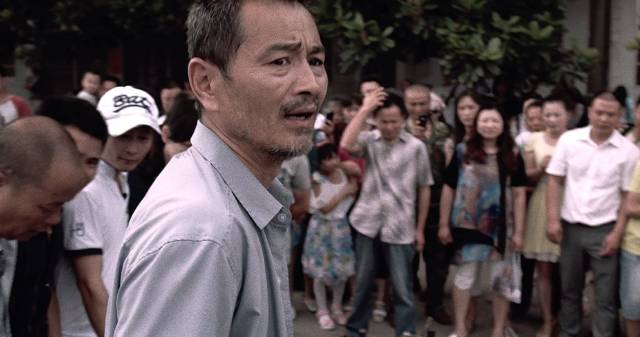
Old Stone (Johnny Ma, 2016)
Unlike seasoned pros Bong and Miike, Chinese-Canadian filmmaker Johnny Ma was a neophyte when he made his first feature in 2016 after attending Columbia University’s film program and making a handful of shorts. Old Stone (2016) is an impressive debut, a taut grim piece of neorealist noir reminiscent of some of the films which came out of the Romanian new wave – movies like Cristi Puiu’s The Death of Mr. Lazarescu (2005) and Cristian Mungiu’s 4 Months, 3 Weeks and 2 Days (2007), in which ordinary people’s lives spiral out of control because of the dysfunctional society they live in.
The film begins in the moments after a car accident. A motorcyclist lies bleeding on the street surrounded by a gawking crowd, while cab driver Lao Shi (Chen Gang) stands off to the side calling for an ambulance on his cell phone. The crowd offers conflicting suggestions – some say Lao should rush the man to a hospital immediately, while others warn of the risk of causing further injury if the man is moved. Not knowing how long help will take to come (chances are it won’t be any time soon), Lao finally gets help putting the injured man in his cab.
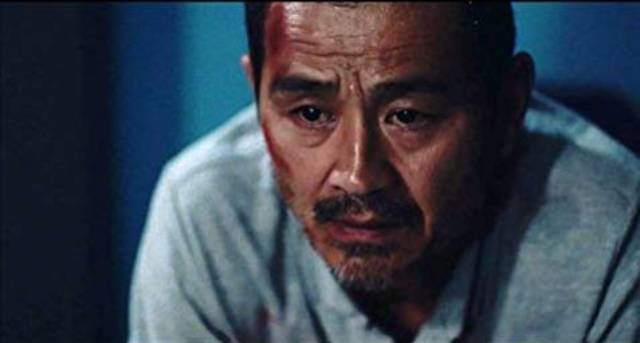
At the hospital, he’s told two things: the man, who is in a coma, would have died if Lao had waited … and Lao is on the hook for the bill for the surgery which has saved the man’s life. The big irony is that it was Lao’s sense of responsibility which traps him in a bureaucratic and personal nightmare. If he had simply driven away after the accident, his life would have gone on without complications; his concern for the injured man drags him towards ruin.
The police aren’t much interested in his story – a drunken passenger had grabbed the wheel, causing the taxi to swerve and hit the motorcycle – and their “investigation” drags on. Because Lao hadn’t immediately called the taxi company and their insurers, he’s in violation of the policy and isn’t covered for the damage. Because he’s the one who brought the man to the hospital, they hold him responsible for the mounting bills. His wife is angry because these payments are draining their account dry…
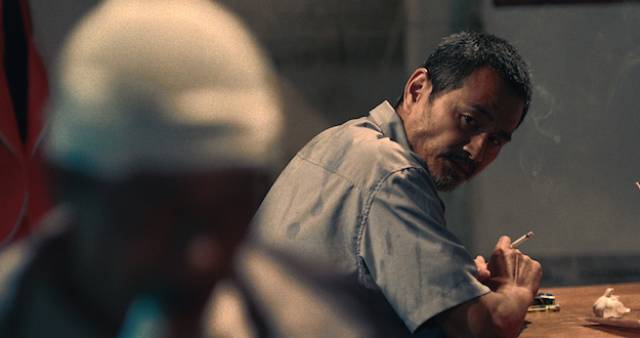
When the latest payment is due, his card is rejected and he discovers that his wife has cleared out the account to protect what’s left. At the end of his tether, Lao, who has been spending more and more time sitting quietly with the comatose man, finally squeezes his breathing tube so he’ll quietly die. Not only does this set off an alarm, bringing staff to the room, it somehow shocks the man out of his coma. Now Lao finds out that due to the traumatic effects of the accident, he will be responsible for helping to support the man indefinitely.
Seemingly with no hope of ever getting his normal life back, Lao embarks on a desperate plan to free himself from this burden … having accidentally injured the man, he now sets out to kill him. But even this plan goes badly, the film plummeting to a bleak, almost blackly comic conclusion. In a vast, inefficient, corrupt system, responding to a sudden, accidental event with decency and concern triggers a nightmare of powerlessness.
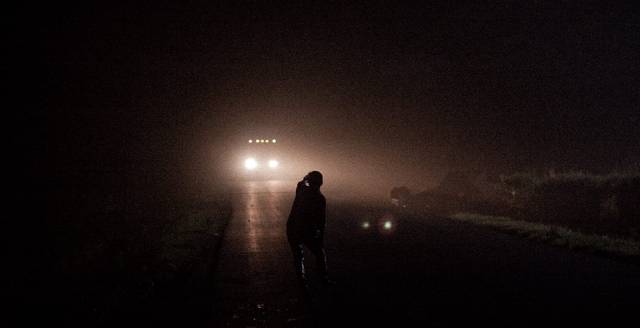
Ma gives the film a breathless pace which makes Lao’s ruin seem both tragic and inevitable. Chen Gang plays Lao as a hapless everyman; once he’s caught in the system, he’s carried along because he has no particular resources to fight against the current and there’s no help available.
*
All three movies receive fine presentations on Blu-ray, reflecting the films’ different stylistic approaches – Parasite’s formal elegance with a luminous visual sheen; First Love’s kinetic action; and Old Stone’s harsh, gritty depiction of a world at odds with human feeling. Universal includes a 19-minute Q&A with Bong Joon-ho on the Parasite disk; there are no extras on Well Go USA’s First Love disk; while Kino Lorber’s edition of Old Stone includes a few deleted scenes, a couple of minutes of behind-the-scenes footage, and Johnny Ma’s Columbia thesis film, Grand Canal (2013), which contemplates the fate of the director’s father, who disappeared when Ma was a child and who may have been murdered by a gangster.
Comments